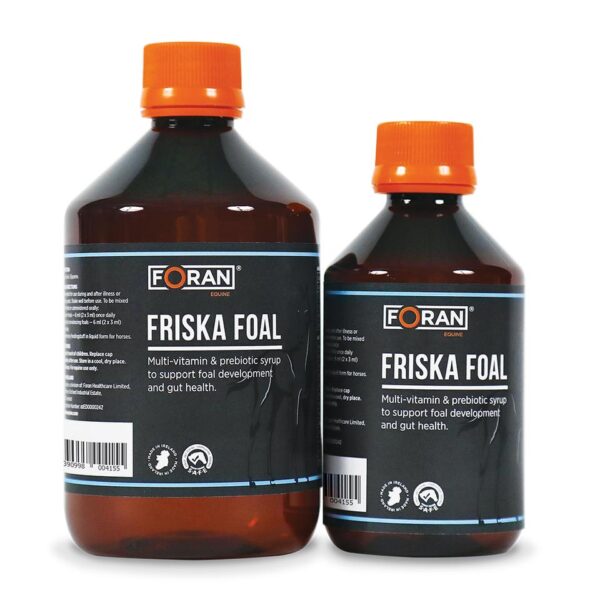Friska Foal
Multivitamin and prebiotic syrup to support foal development and digestive health
View ProductThe initial days of a young horse’s life have the potential to shape its future health and performance for a lifetime, making it essential to get things right from the start.
Often referred to as “liquid gold,” colostrum is the thick, yellowish milk produced by the mare during the last few weeks of pregnancy. Colostrum is calorie-rich, providing essential energy for the newborn baby’s early exploration of the world. It also contains vital vitamins and minerals necessary for growth. Moreover, colostrum plays a crucial role in providing initial immune protection for the relatively vulnerable animal.
Newborn horses are immunologically naive, meaning their immune system is functional but unprogrammed. As they encounter infectious agents throughout their lives, they develop antibodies that provide protection against these diseases. Initially, colostrum is the only source of antibodies for the young horse, safeguarding it from diseases in its first few weeks.
For maximum absorption of antibodies, young horses (newborn Thoroughbreds, Arabians and all other breeds alike) must receive colostrum within 12 hours of birth. To give young horses the best start in life, it’s vital to ensure that the mare produces the highest quality colostrum possible.

Being familiar with the normal behaviours of a healthy animal is crucial to detect any deviations early. Important parameters to watch include:
Heart rate: Typically, above 60 beats per minute (around 80-120 in the first 24 hours).
Respiratory rate: Usually above 30 breaths per minute (approximately 60 in the first few days).
Body temperature: Typically, in the range of 99.5-102°F (37.5-38.9°C). Newborn horses may shiver initially, but this should stop once they’ve suckled.
You can learn a lot about a young horse’s condition by observing specific behaviours and when they occur after birth:
– Attempting to sit up within 5 minutes.
– Demonstrating a suckle reflex within 20 minutes.
– Attempting to stand within 1-2 hours.
– Successfully suckling within 3 hours.
– Passing the first faeces (meconium) within 4 hours.
In the early stages, young horses will nurse frequently, sometimes as often as every 10-20 minutes, and at least 30 times per day. They grow rapidly, gaining 1-3 pounds daily in the first few weeks.
Young horses follow a simple, repetitive daily routine: nursing, defecating, urinating, and sleeping. These activities are occasionally interrupted by bouts of playfulness with their dam or peers.
The first 24 hours of a newborn horse’s life are critical, and any deviation from the outlined milestones should prompt seeking veterinary advice. Any changes in normal behaviour warrant close observation, and a veterinarian should be contacted. Diarrhoea is a common issue in very young horses and can lead to rapid deterioration.
Healthy animals grow quickly, so poor weight gain can indicate that the animal is struggling, or the mare isn’t producing sufficient high-quality milk. In such cases, consult a vet for guidance on improving mare’s milk production.
Multi-vitamin foal supplements can be beneficial for these very young horses facing health issues or recovering from them. Young horses experience stress on multiple fronts during this period, including growth and developing a strong immune system. Nutritional support, such as Friska Foal, our supplement for foals is specifically designed to provide a nutritional boost for babies at risk of nutritional deficiencies, those not thriving, or those with health problems.
Babies are naturally curious and start showing interest in their dam’s food a few days after birth. While the mare’s milk meets their nutritional needs for the first 6-8 weeks, the young horse may show interest in forage and solid food. By 3 months of age, young horses should be introduced to a suitable creep feed as the nutritional value of mare’s milk declines.Young horses start learning to drink water by observing their mother and typically begin doing so before experiencing a physiological need for water.
Supplementing Your Young Horse: Newborn horses experience rapid growth and development, resulting in a high demand for vitamins and minerals. Deficiencies can have long-lasting, irreversible effects, making adequate nutritional provision essential.

Using a specifically developed multi-vitamin for young horses, like Friska Foal, can provide peace of mind that your baby is receiving the necessary support for its development. This highly palatable formula is suitable from birth and well-received by young horses.
Supporting musculoskeletal development is particularly critical for young horses destined for performance careers. Cal-Gro, another mare and foal supplement we offer, includes a well-balanced blend of minerals, including essential calcium and phosphorus in the right ratio to promote healthy bone and joint development in these young horses.
For additional information on newborn horse nutrition, please feel free to reach out and consult with our experts.

Multivitamin and prebiotic syrup to support foal development and digestive health
View Product
Group Commercial Manager GCC Region
Based in the UAE, Nicolas Gaumerais is the Commercial Manager of the Connolly's RED MILLS Group which includes Foran Equine supplements and Connolly's RED MILLS horse feed in the GCC region. Nicholas regularly travels across the Gulf.